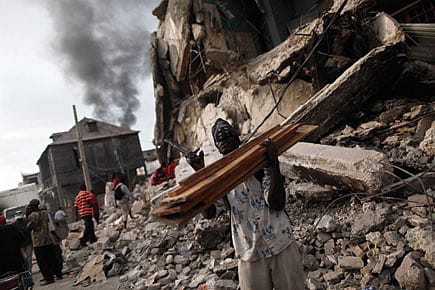An Acceptable Human Behaviour

After a calamity, people say and do things that would be hard to explain.
In the aftermath of a huge natural disaster, like the earthquake that struck Haiti, people behave in unpredictable ways. Sometimes, their actions are so shocking, so odd, that you would think everything you knew about human beings was wrong.
Haiti reminded me of the Bhuj earthquake of 2001. I had reached Bhuj about 20 hours after the quake. Among the first people I met was a man who was standing on top of the debris of his home. His wife and children were trapped under. The Army was yet to arrive and there was no rescue operation underway. He said he could hear them occasionally calling for help, and they would fall silent for a long period, and then he would hear them again. I did not know how to speak to a man in such a situation. I thought I would leave him alone. I turned to someone close by and asked for directions to a public ground. The man whose family was buried under his feet began to give me directions in a very elaborate way, his hands telling me where I should turn left and where I should turn right. He even asked me when the magazine (Outlook) would hit the stands. There are theories to explain what he did, but I think we will never know what was going on in his mind. I would soon meet many men like him.
The photographer I was with, Prashant Panjiar, was accosted several times by people who asked him to take pictures of their dead. We were perplexed by this, but later learnt that they were asking him to take the pictures as proof because in a situation like this, a press photograph was as good as a death certificate. Men whose wives were proven to be dead could then remarry. Children whose parents were legally dead could settle property matters.
In Anjar, where about 400 school children perished while on a Republic Day march, Army personnel had begun the rescue operations. I saw a man sitting on top of a cupboard, under which was the body of his brother. He was breaking the cupboard with a knife. He said there were jewels, money and perfume bottles inside. He wanted to extract them before the Army got to them. A jawan told me, "I am sick of some of these people. Once they realise their family is dead, they quickly think of what to do next. Just now a woman asked me to bring an almirah out. She said there is Rs 350,000 in there. She also said that she will be watching me. I can't handle [this] practicality."
2026 New Year Issue
Essays by Shashi Tharoor, Sumana Roy, Ram Madhav, Swapan Dasgupta, Carlo Pizzati, Manjari Chaturvedi, TCA Raghavan, Vinita Dawra Nangia, Rami Niranjan Desai, Shylashri Shankar, Roderick Matthews, Suvir Saran
In Gandhidham, a town that was badly affected, there were vast areas where the smell of rotting bodies filled the air and stray dogs became aggressive. They stood in packs in front of people and growled. They were probably biting the living and the dead who were still trapped in the debris. The smell of decaying human flesh is a haunting smell with its own deep melancholy. I remember the Bhuj earthquake chiefly through that smell. Standing in that stench, the people of Gandhidham told me how the media was unfairly portraying Bhuj as the calamity zone, and as a result, all monetary relief was going to Bhuj.
There was a rescue operation going on deep inside a huge pile of debris. Jawans finally managed to dig a narrow hole and one of them crawled and reached an elderly man called Joshi. "Where is my wife and son…Whose leg is on my stomach?" Unable to move, what Joshi could not see was that to his left, under tonnes of bricks, was his dead elder son. It was his leg that was on Joshi's stomach. And to Joshi's right was his dead wife. The jawans tried to pull him out but his leg was under a heavy slab of concrete.
The Major who was supervising the whole operation had a decision to make. They had to cut Joshi's leg off to extricate him, but then Joshi could not be given anaesthesia. He was diabetic and in a delicate condition now. His leg had to be amputated while he was conscious. Many people were rescued this way. In fact, there were a few who were stranded for so long that they begged the jawans to cut off their limbs and save them.
In the middle of all this, the Major told me, a relative of Joshi asked him to kill Joshi out of compassion.
After midnight, the Major took a calm, collected decision, which I will never forget. He decided to end the operation for the day because it was too dark and too tough. We went back together to the Army tents. We ate as Joshi remained trapped all night. The next morning, he was dead.
(Test Manu Joseph's newfound appetite for small talk on Twitter @manujoseph74)
